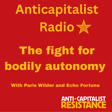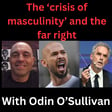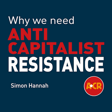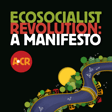Become a Creator today!Start creating today - Share your story with the world!
Start for free
00:00:00
00:00:01

Episode 17: Democratic Socialist Planning and Radical Utopian Aesthetics, with Eric Meier
Simon Hannah interviews Eric Meier (@graete97) on democratic socialist planning and radical utopian aesthetics, as well as some of the basics of the 'planning debates' on the left. Eric is a co-founder of and organises in in the International Network for Democratic Economic Planning (https://www.indep.network/)
Music 'Debunking' by Yuzzy.
Transcript
Introduction and Guest Introduction
00:00:07
Speaker
Welcome to this episode of Anti-Capitalist Radio. My name is Simon Hannah. I'm joined today by Eric Meyer, who is based in Germany and is interested in planning and kind of the aesthetics around that.
Interest in Planning and Socialist Future
00:00:21
Speaker
And we had an exhibition there, which is why I wanted to invite out to come and talk about it, because I have a real interest in planning and kind of the way that the socialist future might work.
00:00:38
Speaker
Hello, everyone. nice to Nice to be here. Yeah, I'm Eric. I'm based in Bonn, Germany, a little bit south of Cologne, the ex-capital of
Building an International Network
00:00:48
Speaker
Germany. And as Simon already said, I'm interested in democratic economic planning. And I'm also involved with a group of people who are at the moment building an international network for democratic economic planning.
00:01:04
Speaker
chart in-depth basically to connect kind of like all the dispersed actors be it individuals be it organizations be it research groups or also people who are doing on the ground experiments or something like that and to connect them so people can share experience experiences constructive dialogue e etc and Yeah, it's supposed to launch in early July. And the provisionary website where you can sign up for the launch and get notified is indep.network. So everyone, feel free to join it to visit that. And it's over with the promo.
00:01:53
Speaker
i've I've signed up but haven't been able to take part in the discussions yet, but I certainly think one of the really important things the left needs to try and get better at is articulating a vision for how things could be
Articulating a Vision for the Future
00:02:07
Speaker
different. I think with the collapse of the ah Soviet Union and China's integration into kind of the global capitalist market, I think There's been a bit of a retreat on the left in terms of envisioning the future, and not just kind of any utopian way of, hey, wouldn't it be lovely if you know this was the the case, but how do we also get there? like one of the What are the campaigns and strategies at the moment that can help us achieve that end goal? So I think networks like InDeck are really needed at the moment.
Neoliberal Ideology and Imagination Collapse
00:02:38
Speaker
Yeah it's it's super exciting like it also it also got off the ground I think really quickly I think I joined the group in March and we're making like yeah we're making progress with like launching in July things are heating up I'm kind of excited and yeah I i totally agree with you with the okay there has been this like collapse of imagination like kind of everyone kind of knows things are shit and things are becoming shittier and shittier as we continue in history and but yeah just like even but there's still this like deeply settled idea that oh the the the market is natural or something like that and like this
00:03:23
Speaker
it it It feels like an overhang of like neoliberal ideology, because that is the ideology that, like oh, the market is natural in the practice of neoliberalism. We know that that hasn't been that the market is a product of statecraft. like the states States have to actively create the conditions for markets to emerge and to function. and But he had like the ideological side of, like okay, what do you like with what what is your political message?
00:03:52
Speaker
And that's like so deeply ingrained into people's brains. And also i I find really interesting the side of planning research that is not necessarily like, there is this side that's like very model focused of, okay, oh, you have like, you, everyone has their little pet model, be it participatory economy, be it like the cock shot cottrell model, be it like whatever it is, Sarah's model.
00:04:22
Speaker
People who are a little bit in in that like know what what what this means, so but I find kind of like research that's bridging the gap kind of like, of okay, where are we? And where do we already see developments that are kind of like pointing towards potential for, okay, things are really shifting here. That doesn't mean, oh, socialism is naturally emerging or something, but like, okay, how does corporate planning work, for example, and how does corporate planning work in our given technological state? And I find that stuff super interesting because that's also, otherwise we don't even have that on our radar.
00:05:05
Speaker
Like if we say oh everything that happens inside of corporations is like evil unnecessarily capitalist and we like okay it's it's capitalist but in the sense of like, there's no sense in salvaging that then it kind of like you.
Capitalism and Socialist Ideals
00:05:21
Speaker
Like you've made yourself, ah you've thrown out all the possible weapons from the outside. So to say like, I don't have better words for describing that right now, but you know what I mean? And if you have it on your radar and really go like, okay, what is happening there? And it's not like, Oh, is this is just technology that's there. But like, how could that be contested? How could that become like part of, for example, worker struggles and like.
00:05:46
Speaker
for maybe doing like something like the Lucas plan of like, okay, how could something like the Lucas plan work today with contemporary corporate planning procedures? Yeah, something like that.
00:05:59
Speaker
I agree, and i I think it's important that we we do point to the way that capitalism is already socializing the means of production. I mean, this is obviously important. you know Lenin made it back in the day where there's actually very few companies these days that are outright owned by a capitalist. I mean, obviously, you can look at Twitter with with Elon Musk and and in examples like that. but most capital these days is socialized in the form of um you know shareholders and boards of directors. And so looking at the way that capitalism has already and also imperialism has has created monopolies, but also socialize them. and And then the way that we can use that as the basis of building a a planned economy, I think is crucial. I think my only caveat, though, because I think there's a bit of
00:06:46
Speaker
a tendency, especially from kind of the Jacobin left people to sort of just say, hey, you know, we've already kind of got socialism. I mean, look at Walmart, look at the Amazon algorithm. Look at, I mean, Grace Blakely has got a book that's just come out recently about about vulture capitalism, which which kind of makes the case that capitalism is already planned. I think there's always a bit of a tendency on the left. And I think also people do get it from Lenin because There's a few things that Lenin said, like, for instance, he said, socialism will be like the German postal service, you know, I national, very efficient, like, well run, maybe, but I also think it's a bit of a, like, it it always runs the risk of sort of taking the radical content out of socialism, I guess, because it's like, hey, we already have like the German postal service, it'll just be like that, but much bigger, maybe with elements of workers control. And I think we're still trying to kind of work our way out towards
00:07:39
Speaker
How do you take, say, the vertical planning of of corporations into and turning into horizontal planning and also integrated planning on a local, regional, national, international level thing? And obviously, we probably won't really know the answers to that until we actually start to build it.
Strategic Communication in Socialism
00:07:54
Speaker
But I'm interested in in those kind of ways of thinking about some of the problems.
00:07:59
Speaker
What you just said with the the possible problems of like over emphasizing already existing the already existence of planning and i think i see that from like two sides one side as like let's say like a more rhetorical strategic communication.
00:08:17
Speaker
to like it's kind of like okay slap people in the face and like like shake them really bad and like wake up this isn't the market that you used to know and so like to to be like a little bit hyperbolic so to say and so i think that aspect is good that aspect is good and because that's kind of like the basis for like that's kind of like the basis for people to maybe then come to the conclusion that o Actually, this is not the planning that we're looking for, or that's not the whole deal. and But I think like if if like that critical judgment requires the okay shaking people up first of first of all, I can get behind that. like I like to look at books
00:09:04
Speaker
like has come like I've developed like this past couple of years away from like a very academic reading of books and more like, okay, what kind of strategic role do they play in like the political ecosystem? Like what does this book do rather than is it correct on these and these and these points? And so yeah, like a little bit different of an approach. So I can understand why, for example,
00:09:28
Speaker
Grace Blacklee is writing something like that. And I won't be as harsh as maybe other people on on that. I think it's also probably yeah like you said around framing, I think is important because I think both have got powerful arguments for them because to say to say also, hey, socialism doesn't need to be that scary. We already have aspects of what we will need in the current
Developing Democracy and Worker Control
00:09:52
Speaker
society. You know, there's already A lot of vertical planning there's a lot of state management there's a lot of regulation of the private sector well increasingly less but you know there is but some regulation the private there's already things that we can point to and say well what we want to do is you want to extend and develop these under a more radical form of participatory democracy and workers control i will democratize the economy more more generally.
00:10:19
Speaker
so we abolish the distinction between the politics and the and the economic sphere and that doesn't need to sound scary because capitalism is already kind of doing that itself so I kind of take that as like you said as a rhetorical general point and I think that has that has a lot of value I mean you know the like the People's Republic of Walmart book I think as you said there's a bit of an intervention into that discussion just to say well obviously Walmart's kind of an evil corporation and yeah responsible for massive climate change and and you know whatever but it it does point to something in the future so i think there's that but then i i guess the thing i'm also cautious about is that
00:10:53
Speaker
is that we need to be clear about how revolutionary and radical ah ah a socialist economy would be. And I guess there's always a slight danger if we bend the stick a bit towards the incipient sort of models that exist now, we sort of take away the radical character. I think it was a bit like Jeremy Corbyn in Britain when he was leader of the Labour Party. The left couldn't decide whether he was like a radical, he was going to fundamentally change everything and undo Thatcherism or as people kept on saying, hey, he's no more radical than an average Norwegian prime minister, you know, sort of, these this is really extreme European stuff, you know, so there was always a bit of disagreement over how to frame it. But maybe that's just an inevitable, you know, part of whenever you're trying to put radical ideas forward.
00:11:35
Speaker
Yeah, I was I was just just thinking like I would kind of like make the and let's say like the other side of the coin of what you were just talking about with like, okay, oh, maybe ah and like I was thinking about the work but of Paul Adler this bit.
00:11:51
Speaker
business ah business school management, scholar type of guy. I haven't read much by him, but what I've read, I find very, very interesting. And the talks that I've heard, because he basically like makes the point that, okay, certain kinds of management practices that are already in existence.
00:12:11
Speaker
specifically in certain companies that are like very let's say like where values scare quotes but also not really scare quotes play like a huge part where basically okay hey of course they are still run for profit but basically certain management practices that they have already confront problems that we would also have in a democratically planned economy, like specifically questions of okay centralization, decentralization, team cohesion, and on like a very concrete organizational level. I remember he talks about
00:12:46
Speaker
research and development and the problem of like that stuff like from research and development and specific product development becomes like decoupled over time and like how do you because the research and development aren't like they're not on the ground enough so to say and How do you tackle that problem? I found that really interesting because it's like, okay, hey, maybe certain problems at least in democratically planned economy and socialism might not be radical at all. In this in the sense that they are just as mundane as stuff that and that we also might face on a day-to-day basis right now and certain problems won't change.
00:13:30
Speaker
i liked I used this, which what ah Adler talked about with research and development as a heuristic for thinking about, okay, what role does ah do ah model the model discussion in planning, what role does this play? And like, oh, how does this become like a little bit detached from like, oh, the more underground reality and stuff like Adler's work very much of what I know. It's it's kind of cool. Yeah.
00:13:54
Speaker
Yeah, the book I've got is the 99% economy. I think that was the main one. Yeah, that was a really, I thought that was a really good book. And also kind of in a similar vein to very similar to Utopia for Realists by Rutger Bregman in the sense of, although Adler, as you said, is more of a business management school thinker. And Bregman sort of made more of a futurologist. I'm not sure you want to call it but both making a popular non-Marxist, well, non-Marxist language anyway, cases for different ways of thinking about the economy and how it could function. but I thought Adler's book, like since he is from a business management school, ah like it's a very interesting look from the inside about the way that corporations are structured and how actually, from his perspective, that isn't the best way of running things.
00:14:44
Speaker
Which is quite unusual, because obviously a lot of business studies, business management, school thinking is so hopelessly mainstream and boring and narrow in its focus. So when someone like Adler breaks out and says, well, actually, maybe if we did have democratic control of the economy and, and and then as you said, I mean, and I think this is very important whenever we talk about socialism, it's not that socialism fixes all the problems, it is that Socialism as a democratically planned economy provides us with better tools and means to fix the problems that we have.
00:15:18
Speaker
I can maybe make a a connection here to to the art stuff because not going into the exhibition right and like immediately, but i like especially in music, but also in like utopian dystopian films and art, there is this very like this common trope of, oh, there is like this utopia or something, but it has like this dark underbelly.
00:15:43
Speaker
That's kind of like hidden, but that glitches through like ah the surface the Utopia on the surface. and then it became like the the critical The critical move is to kind of like expose that the Utopia is built upon the need of this dark underbelly.
00:16:00
Speaker
and But that's kind of like what that's what's done and there's nothing more and I there's one album like I'm a big fan of like vaporwave vaporwave adjacent stuff and which has well it's not like the only the 2014's vaporwave the floral shop and stuff but like it has become like this huge huge like Umbrella genre, one album that is called Solarpunk Workspace by Space and Vapors. It's it's basically just office ambient noises with a little bit of like, oh, it didn't, the titles are called Zen reception or something like, like a little bit ironic. And you would probably imagine, oh, there's like the same, the same top was again of like, ah, there's this dark underbelly
00:16:52
Speaker
of this like utopian workspace and everything is fine. But like the album musically sucks. Musically, it's super boring. But it made me think of like, okay, no, what's presented in this album is all there is. It's just the office. There is no dark underbelly to the office. there is the it's kind of like It's just surface.
00:17:16
Speaker
And in the sense, like connecting that to the to that is kind of like, oh, it's not the revolutionary thing. It's like, oh, we need to expose the dark underbelly and get rid of the dark underbelly. But rather, if we say we we had like like if we had power, did we know what to do with it?
00:17:36
Speaker
If you were, for example, in like a self-governed firm with colleagues with comrades, would you know what to do with that power? And the knowledge of that will not magically come to you by getting rid of capitalism. It's like this very, very specific, how do you want to work? How do you want to relate to your colleagues? Like very mundane questions that we also have today, but we are just constrained in our ability to determine these things.
00:18:04
Speaker
And yeah, maybe the, it was just my, the art bridge for myself because I was like, Hey, it is. Yeah. One of the difficult things for revolutionary is when they actually take power because then you go from revolutionary to like a bureaucrat, like administering some kind of state or semi-state formation. And you often don't necessarily have the skills and the, and the knowledge to do that. Same with kind of the bourgeoisie to a degree when they took power in the, in the revolutions, it was.
00:18:33
Speaker
They also had to learn how to rule and they had to wrestle with the old order and grappling power away and obviously those were quite bloody enterprises in a lot of countries. That idea around being able to use the tools in a good way but accepting that there will still be problems, there will still be debates over resources, there will still be debates over who gets what.
00:18:55
Speaker
but they can be organized so much for all. I guess it's a very good starting point of framework, but as you said, it's not like there's this thing called socialism that comes down from heaven and then it just, you know, resolves all the contradictions. I remember when I was researching my book on planning, I was reading about Yugoslavia.
Challenges in Democratic Planning
00:19:11
Speaker
self-management phase. and Obviously, there were particular issues with Yugoslavia and because of the self-management model without ah like a wider plan of the economy and without any state control over exports and imports. It meant that a lot of the factories, especially in the the west of the country, were trading directly with Austria and Italy and ah Germany I'm getting quite rich you know because they're part of the export markets and so on but it because they said workers control me every so often we have to have a like a workers meeting to discuss you know what they're going to produce mother going to sell it. But all of this stuff was like far beyond the heads of the workers they literally because it was really complicated questions of investment strategy and export you know complete like licenses and like what's going on with the global markets i mean they just literally didn't know so they don't be these these experts would come in.
00:20:02
Speaker
who would kind of give them like a business case and then they just kind of vote for it and there was one left-wing sociologist who went to Yugoslavia in the 60s and early 70s and she was touring around and she said that some of the workers control meetings it was more like a board of shareholders you know because they kind of had an investment in the company but it wasn't really workers control in that sense it was sort of it was this other thing because because it didn't have the wider democratic plan it was just much more just the cooperatives I mean, they weren't even really cooperatives, but you know, like like the kind of worker self-management ones. So I think that also like goes to your point about even knowing what to do under a like a post-capitalist system, you know, is not something that comes easily. Yeah. What you just said with the, okay, hey, because nobody, like people didn't know what to do, didn't understand like all of the complicated stuff, like their implication and developments at the world market stuff. And then like some.
00:21:00
Speaker
People with a business case came to them and they wanted like, I was, um i'm I mean, it's this typical of like, okay, complexity reduction of like, you have this like huge complexity of your environment and how do you translate it into something that's relevant to you that you can understand from your point of view. And I think like with regards to planning the whole, that's going to be a huge, huge, huge question. Like.
00:21:27
Speaker
And i'm I'm kind of, i'm I'm happy and optimistic with regard to the planning discourse. Let's say like, I think like two years ago or something, at least at least in a German discourse, there was still very much the kind of like a little bit of a dichotomy with, okay, hey, you have like the more technical.
00:21:47
Speaker
poll and the more like or political discursive poll. And they were kind of like, discussing before another, let's say one says the other is technocratic, the other says the other is utopic, utopian, how these things go, you know what it is. this And ah what I've seen over the past few years is that they have kind of like come together and not conceive of each other as mutually exclusive. But as like, okay, no, we need technical means.
00:22:16
Speaker
in order to even make democratic deliberation and decision-making processes even possible. like Because there's like such huge complexity of decisions, of data, of everything, a human mind cannot comprehend this. So how do you need technical tools? And then the question comes up, what kind of technical tools? What's the relation of people who to them who designs these? And all all that stuff. It's super also like a big can of worms.
00:22:44
Speaker
but That's like, oh no, yeah, the technical means can become like this enabling force for even having a discussion to have like some options you can discuss and not like there's like this limitless limitless space of possibility where like that doesn't make sense to discuss about that.
00:23:01
Speaker
and And so that's like and a development that makes me a little bit optimistic, could have gone worse, to be honest, in that regard. With regards to the eco-socialist discourse at the moment with the polarization between like de-growth and socialist eco-modernism, I feel like, okay, that's and of like going in a, in a
Socialist Calculation Debate
00:23:21
Speaker
bad direction and it's very unproductive, but I hope it's also like nearing its breaking point because I see so many people being so frustrated with that. That is kind of like, okay, you're repeat, like both sides are kind of like repeating the same points over and over again to each other. And yeah, I, I hope that like things will change in, in, in that regard, but yeah, planning, planning this course had like a little bit more luck in that regard. phil
00:23:50
Speaker
Well, I mean, the point you raise, obviously, is that it goes back to the famous socialist calculation debate of the 30s that, you know, as the Austrian economist said, you know, it's it's impossible to plan everything, they like no human mind or no central committee or central planning bureau can possibly deal with all of the millions or billions of calculations that go on in the economy. And there's been so much work done around that to kind of challenge that notion. But I mean, first of all, challenge the terms of the debate, because the idea that a single person or one planning bureau decides everything is is well, in in the ways that was attempted in the Soviet Union, that was not a good way of doing it. yeah But even then, that's not necessarily
00:24:30
Speaker
like what most socialist would think about in terms of like a planet but then as you said there's lots of new things going on around me computers are new but say i am the way that that could be used in the way that we can sort of probably.
00:24:43
Speaker
kind of all but almost like auto manageage a lot of decisions around production for consumption. I think there's cases like if we still have schools under socialism or whether we've completely changed the system, but you know everyone knows that come the end of August, early September, people will need pencils and rulers and and and and and and whatever because they're going back to school. So there's like rhythms of consumption that you can already point to, it which and unless we totally changed a system, that rhythm of consumption of social under capitalism will probably be relatively similar.
00:25:16
Speaker
But then the big question I think is over things like investment because you can't really rely on AI or computers, you know, sort of, if there's only so many labor hours and time and resources, are you building this or are you building that? And like that's where, like, I think it'd be a more healthy society if we were focusing human brainpower on those big questions rather than sort of, you know, the minutiae questions of economics on a kind of day to day basis.
00:25:42
Speaker
and I like that idea where like, okay, hey, you don't think about the economy as like, oh, it's just with this one monolithic thing, but they're different aspects, like very predictable consumption patterns, like as you said, with school, then investment, and then probably related to that also innovation and research. And and then you probably also have like just especially with intensifying climate crisis, emergencies and emergency responses.
00:26:11
Speaker
And probably the recurring consumption patterns thing will probably be the easiest to take care of. And the other ones are going to be like probably the more complicated ones. Like how do you, yeah, how do you, I know that if getting more of.
00:26:27
Speaker
has like often focused on okay hey the or made the point ah that the new socialist planning discourse is very much focusing on this okay how do you provide necessities how do you basically take care of these normal consumption patterns ah but didn't really have to say much about invest about innovation and kind of like the production of novelty and that like is this one thing that neoliberalism has like as it's ideological core when selling itself to people of like, oh, we're dynamic, like everyone can start a business and stuff. And, and I think to a certain extent, I think he has a point that hasn't been like that much of a focus and hasn't been that discussed. Doesn't mean that there's as impossible, but yeah.
00:27:18
Speaker
Yeah, I guess in that like it's good to challenge also the neoliberal thing of how, well, I guess just the capitalist propaganda of how efficient capitalism is
Challenging Neoliberalism and Economic Trials
00:27:28
Speaker
a new idea. Yeah, um the the the the whole Marianna Masaccato thing also with the entrepreneurial state entrepreneur estate and I feel like that's, I mean, when I, when I follow, like I follow her on Twitter and when I see like, what what kind of events she's speaking at and what kind of, I feel like that idea is already really reaching mainstream of like with the kind of return of industrial strategy. Also, like, especially in the US. Yeah, I feel like this idea of, okay, oh, the market is just this like super dynamic thing, like is
00:28:01
Speaker
at least I feel like maybe here we have a certain kind of like there is a certain establishment institutional avant-gardism that they are kind of like one step whereas lots of people still believe like in these like fundamentals of neoliberalism they are already like a little bit far further beyond that but maybe that's a little bit slender here but I don't know like Well, like it's interesting how how often people in the but public sector politicians will just repeat, you know, claims made by capitalists, even that the capitalists themselves know are not true. I mean, I you know yeah know that a lot of the
00:28:42
Speaker
you know the things that they use especially in the techno revolution in the technological revolution but a lot of the university is developed by the military, the companies just found a way to pay to particular things and you know and kind of package them and sell them and i was in the capitalist know that but when it comes to kind of public discourse from politicians, they kind of go along with the life of.
00:29:03
Speaker
of like what's going on i mean even in the public sector i know which is where i work in often have things where they'll talk about outdated business management strategies for my twenty years ago or something and they'll be like are you going to do this kind of new really exciting thing and it's like they stop doing that in the nineties like you need to realize that that particular but all organizing work didn't work anymore but yeah.
00:29:25
Speaker
Yeah, oh my if a friend of mine is doing, I don't know what this exact ah job description or job title is, basically he's working in organizational consulting. And he says it's like, it's like a hell, it's like a hellscape. Like what the way, the way people are working and like.
00:29:47
Speaker
Yeah, it's I won't get into that. But basically says he gets like his his work done in like two hours a day, basically, and has to pretend he's working the rest of the the rest of the time. And yeah, just yeah and and then people at the top at like the the higher levels have like no idea what they're doing. And it's just like seniority and like pretending. Yeah, it's bullshit.
00:30:13
Speaker
when he makes the case for a 15-hour a week. It was actually interesting because in Britain, there's been a push for a four-day working week, at least in the private sector. The government has have a very right-wing government. The government has had absolutely no four-day weeks in the public sector. They've kind of banned it, actually, even as a even as a talking point. oh um But there was a national four-day week pilot last year, which was very successful and like 90% of the companies involved, so they were going to make it permanent and everyone was happier and workers were less sick. And I do think that is, even under capitalism, I guess that goes back to the conversation before about, are there things within capitalism which are already happening? There is a bit of a thing around the four day week, because I think even a lot of bosses now are realizing actually, yeah, with modern computers and the internet, I mean,
00:31:00
Speaker
Why does have people sitting around not doing any work and want to just like get them to do all their work in in in in a twenty ah eight hours or whatever and and give them the day off for me like and and workers are more efficient under those working conditions so you know like even under capitalism but obviously within the public sector it's still kind of chaotic and and slow and bureaucratic and and the politicians won't push for genuine efficiencies in the public sector. They just kind of crush it all with austerity. So the and thing I wanted to talk to you about, Eric, was your exhibition that you did
00:31:37
Speaker
Last year, is it now? I think it was.
Intersection of Art and Economic Planning
00:31:40
Speaker
Yes, last October. yeah the the The aesthetics of democratic planning is at the right title. The other right title is Art Design Aesthetics of Democratic Economic Planning. yeah I wanted to keep it like as all-encompassing as possible.
00:31:58
Speaker
yeah Yeah, I can tell you a little bit about the background. So maybe like also personally, and for everybody who's listening to this, I'm totally not an art guy. Like I've not grown up with art in my like, like art as art explicitly in my like cultural background or whatever. I Still kind of hate going to museums. Basically like last year I had like a little bit of like an artistic awakening you could basically say and realize that okay hey maybe some of the stuff that I like is actually you could call it art or like aesthetics or something.
00:32:42
Speaker
And so, and immediately kind of like the combination of that with political ideas came into my head and like, oh, how could you combine that with democratic economic planning, etc. And then in the summer, there was like a publishing wave.
00:33:02
Speaker
of articles in German, like magazines, newspapers, and I don't know, it was like five or six articles in one month about planning, about economic planning. And this was also not in magazines or newspapers that are leftist, like it wasn't like a niche leftist thing, like that was like huge mainstream magazines.
00:33:26
Speaker
And I think almost all of the articles were like at least neutral, like maybe with like, okay, like critical remarks here or there, but also a lot of them from like researchers who are working on that idea. And I was like.
00:33:42
Speaker
Okay, this is surprising. I didn't knew we were at the point where we would now do like, okay, it's public hegemony time. We spit out these articles. And so that like caught me very much by surprise. But as it is with articles and newspapers and stuff,
00:34:02
Speaker
most people see like the the title and maybe like the image that's associated with the article, like you know like the header picture. And let's say 95% of people only see that part. And that's kind of like that's the basis of their impression of their opinion about the article. And that's it. if For example, if you scroll your pipe or your timeline or something. And I realized that the images associated with those articles were very lackluster. like Basically, a lot of them were like, oh, here you had a line of cars from like the GDR, for example, or some super, super abstract stuff that wasn't, I don't know, you couldn't connect it to anything. And I realized, okay, what are kind of like the images we associate with democratic economic planning, like the aesthetics that we have?
00:34:58
Speaker
And it's basically either like some Soviet aesthetics with some like cyber computer elements infused into it, or it's Amazon or Walmart, but make it socialist. Big computer will plan the economy. That's even a meme on on Twitter for what? And, or it's Cybersyn and the Cybersyn aesthetics. But like basically those are the three dominant planning aesthetics.
00:35:24
Speaker
And all of them have like associations which are, I think, not suited for like the wider discourse. like The Soviet aesthetics are kind of like obvious. The Amazon or Walmart that make it socialist is kind of like, OK, it brings up all the fears around AI, AI totalitarianism. and like But now it's, oh, no, it would actually be like a benevolent AI.
00:35:50
Speaker
and has like very much like it it doesn't address all of the stuff that people don't like about amazon or walmart even people who like capitalism and the cyber synesthetics is like it's just very melancholic it's like oh the left is kind of like still clinging to its failures and this idea of Oh, back in the day, there once was this opportunity to change things radically, but the opportunity is gone and everything we can do is mourn it and remember it. And, but like the real stakes aren't there anymore. And yeah, so that's kind of like the starting off point. And I wanted to raise like the the discussion just for, okay, like raise awareness that we need kind of like.
00:36:41
Speaker
an aesthetic dimension to this, especially when it comes to public discourse. But we also need to think about what kind of like, yeah, there's, there's so much to say, but like that as a kind of like, what was the starting point for the exhibition? And yeah, that's interesting because certainly in in Britain, I think we have, we have almost no aesthetic and very little discussion around planning. Like I think, I mean, there's been, there's been some things recently which have got people thinking outside of the left, also around around kind of post capitalist thinking. So there's post capitalism by Paul Mason, which is about you know, sort of everything is, you know, like intellectual labor now and
00:37:27
Speaker
3D printing and JPEGs and zero marginal utility, you know, all this kind of thing. yeah And it was, I remember Stanley's fully automated luxury communism, which was a bit sort of like, hey, just let the computers do everything, it's going to be great. But like, in terms of planning, generally speaking, there's not many things that are really broken out into into you know more mainstream. And by mainstream, I mean, I guess people on the liberal left talking about it rather than just kind of socialists talking about it. So when you say like the aesthetic of it, like that that's very interesting because I think in yeah like i think in many ways, it's still like a very backward concept.
Aesthetics in Socialist Imagery
00:38:03
Speaker
you know How do you even conceptualize these things? And there is a real tendency
00:38:08
Speaker
on the revolutionary socialist left who are at least organizing and trying to build political forces on the ground to so you know still have a lot of like soviet iconographic images which is very much rooted in kind of the worker peasant unity which in some parts of the world still resonates you know i think you know there's parts of the global south and or indio even still parts of china where maybe that has some currency but obviously in in countries like germany and Britain in 2024, it's just really comes across as quite iconoclastic in a way because it's so and's so divorced from any connection to the present. So I think that's a very interesting way of thinking about it.
00:38:49
Speaker
Yeah, it's it's like this, okay, you're, I feel in a certain way, it's also similar to the Cybersyn stuff, where it's like, it's, you're clinging on to this aesthetic as like this identifier, as like this identity creating thing that, oh, I'm a socialist, especially when you're organizing on the ground, those are my my, this is my symbolism, but it's more like,
00:39:15
Speaker
for the symbolism for its own sake, rather than, okay, it has actually a relation to what to like the conditions of today. I mean, I can say like the identity creating force of it is ah still a condition on the ground. You might make that point, but like that's for like a very small constituency of people. And Yeah, like there's so many, so many dimensions I can go into, but I think I started thinking about this really more from this, like from a very strategic pragmatic angle of, okay, hey, there needs to be this aesthetic dimension also because like public discourse doesn't work via like rational argumentation at work. Like.
00:40:01
Speaker
To really, really simplify it works on vibes, like basically on semantic and on associations of like, oh, you hear a word. What are your first two other words and first feelings when that word pops into your head? And I think like a good example where I can see that is with de-growth.
00:40:19
Speaker
like and that there has been this like semantic kind of like condensation that when people and why the public here degrove if they even know what it is they probably think about all scaling everything back everything has to be rule and small scale and like or even like worse they think about like eco austerity.
00:40:40
Speaker
like Those are probably on the wider public their first associations. And we might consider ourselves lucky with regards to planning because I think those kinds of associations, at least for this new discussion, aren't there yet. like There's still like this open space of what kind of like associations can be forged.
00:41:03
Speaker
But once they're forged, it's really, really, really hard to change them. So the question of, okay, how is like the idea depicted? like What kind of images is it associated with? What kind of vibes, for lack of a better word, is incredibly important. like You can say something on the theoretical level as much as you want. If it doesn't like if it doesn't play to this part of people's mind of their lives, it's it's useless.
00:41:33
Speaker
Yeah, yeah, I definitely think with some of the de-growth and I mean the environmentalist things in in general, there's a lot of sort of bucolic communism, ah you know, the cottages, the little river running through the stream. Yeah. Very nice. I mean, we kind of use that imagery for our eco-socialist conference last last year, but I mean, eat like even that is a very sort of but you know thing around like the supremacy of nature and and it doesn't really deal with the fact that humans people live on the planet and will continue to live in cities and so and and towns and villages as well, but like you know like it's not just a back to nature.
00:42:11
Speaker
kind of elimination of people, any kind of eco socialist planning has to be about balancing and sustainability. But even then kind of being able to capture that into something that that, you know, that makes sense, which can be understood is difficult. I mean, that's obviously why the hammer and the sickle was so effective.
00:42:30
Speaker
arguably in in the Soviet Revolution, it like you represented a clear thing around the class forces involved in making the revolution happen. But I know there's attempts to update it with like an Apple MacBook and a and ah and ah you know i don't know what else people you know and ah modern truck or something, you know like but it's not really yeah like it's not really capturing, I think, also the essence of what we're talking about in terms of the aesthetics upon which the struggle will happen for a new world as well. It's not just what that new world might look like. but
00:43:02
Speaker
Yeah, but like totally. That's like a super good point. I think there's like ah we now go into like the different dimensions of it. I think theyre like you kind of like what we've been talking about so far is, for lack of a better word, you can call it like the propaganda or like the marketing dimension. like Let's call it marketing because that's what everyone does. like propag like Marketing is just business propaganda. You could basically call it that. It's the same function.
00:43:30
Speaker
and yeah but also the question of like okay hey beyond that or maybe in intention to that you have like okay depictions of like actually a better world a better life or maybe not like what i've been also thinking about like it has been a big part of the of the exhibition is there is the like naturally you have naturalistic depictions versus abstract representations like okay for example i had like a couple of pieces of solarpunk art in the exhibition also i want to make clear like most of the exhibition was just organized and curated by me and there was like a few pieces by like who i did myself but most of it was done by other people
00:44:18
Speaker
Yeah, and like Solarpunk is kind of like the contemporary utopian aesthetic that is not like from the 20th century. And I also think it has its downfalls and problems, but it at least goes into like a nice direction. Like it's it's kind certainly contemporary Solarpunk.
00:44:38
Speaker
But lots of solar pung really is this very naturalistic depiction of, oh, this is how we should live. This is how things should look. And in the end, it's like, okay, why do you want things to look this way? Why do you want to have this kind of life that's depicted on that picture? It's because it evokes a certain feeling inside of you.
00:45:03
Speaker
like Okay, that's the good life. That's like something I want. That's like freedom. That's like whatever, you know, and if that feeling wasn't evoked by the depiction, the depiction would be worthless and like in the sense of like you wouldn't find it attractive and so I think evoking a certain kind of feeling like freedom, like liberation, he these abstract credit ah emotions, they can also be represented by like abstract things that aren't like where people might ask, okay, what does what does this thing have to do with planning? Like because it's an abstract shape or something and it's like a dynamism is depicted or something that evokes the idea of dynamism.
00:45:47
Speaker
And so yeah, there's like the whole thing about like abstract representation versus naturalistic representations, because so much of stuff is like just naturalistic representation. And people who don't don't aren't even aware that what they're basically doing is like cozy versions of like architectural renders.
00:46:06
Speaker
ah That's what they're doing, basically. It's like cottagecore in the face of but ah you know blood planetary ecocide. The fundamental purpose of the exhibition was not to say, okay, here is the new aesthetic that we need, because I think we' are not there we're not there yet to be able to provide that, but rather to... like first The first part of the exhibition was like taking stock of existing so aesthetics,
00:46:32
Speaker
that are connected to the planning discourse. The ones that I mentioned, I had like a few depictions of these graphs of planning processes were also there. Then a little bit of solar punk as a contemporary utopian aesthetic, and I think a bit of interface aesthetic, like from the half of socialism game.
00:46:53
Speaker
You just said a little bit more about that in case. Ah yeah, okay, yeah. The half of socialism game, everyone that's based on a book called Half of Socialism by Drew Ivertisi and Drew Pendergrass. And it's like one of these that has an overlap between the eco-socialist discourse and the planning discourse. And the game is like, you can think about the book, whatever you want, like that's completely fine. But the game is kind of like,
00:47:20
Speaker
Like, of course it's related to the book, but it's basically, it has a climate, a simplified climate simulation running at its core. And you can basically try out different policies, different technologies, and see how these affect the simulation of the climate and basically see, okay, what kind of like policy technology mix and then there's also you have to navigate some parliamentary dynamics. Very, very simplified. It's.
00:47:50
Speaker
an amazing game. I think it's it's like if you Google half of socialism game, you'll find it. And the whole game basically consists out of interfaces, different series of interfaces, taking stock of what's already there and then going into a little bit more experimental direction.
00:48:11
Speaker
Basically I asked people whose artistic style I already liked or whose work I thought, okay, there is like aesthetically a connection to that. Hey, do you want to be part of that exhibition? And either can I use your artwork and write like a little bit of text commentary?
00:48:28
Speaker
or do you want to make like a custom artwork for that like i commissioned stuff and gave people like a tiny primer on democratic economic planning but basically they were complete outsiders from this course and that's exactly what i wanted i wanted people from completely outside to like compress their associations with that idea in an artistic way and to see, oh, what do they think about that without knowing too much about it? And that was really, really cool. That was the the second part. And the third part was like a little bit of my own stuff, which is mostly abstract collages and digital collages.
00:49:11
Speaker
It also makes you challenge the symbols and imagery you see every day, because every time you go into town or or wherever, you're bombarded with advertising, which I know is an obvious thing to say. But if you just see the logo of a shop, like a supermarket, that just triggers in your head all of the assumptions you have about commodities and wage labor and and how the economy works. and so be able to have anything which is a visual or audio visual whatever thing which kind of ruptures that and shows like even a glimpse of the kind of and like agitational and also art polemic way of being able to just shake you out of that and think differently i think is really useful and very important.
00:49:55
Speaker
this is this is really really good because I was like what you just said how much like the logo of a shop can like bring up all of these associations in your head like I was also starting like when I crafted the exhibition I was also so thinking a lot about like contemporary graphic design like when you think about like what we have is like the contemporary graphic design paradigm which is called corporate memphis it's like very flat graphic design when you think when you when you see when you go on Google and you see that or you think about how all big tech companies are representing people and it's like very cartoonish flat with like these very extreme colors that can that's corporate Memphis.
00:50:37
Speaker
And it developed out like what came before was, which is now kind of like getting a re-examination, especially on like YouTube video essays and stuff was this paradigm called Brutega Arrow, which is kind of like starting with like Windows Vista, which like, it's like.
00:50:56
Speaker
Blue, green, like nature, lots of water, lots of like bubbly as like, like, if you think about every interface from like the late 2000s to like the mid 2010s, all of that is kind of like through to get arrow and the whole kind of like,
00:51:15
Speaker
relation to the world and to technology that's mediated through this interface design through that graphic design was a complete like is super super interesting it was completely changed with like the switch to corporate memphis and i think i even had like a few pieces that like like one one piece was in the exhibition also used a lot of rutiger arrow elements and Yeah, but one of one of the things is also that I like, I always thought that the whole, okay, this is kind of like a mishmash of different styles, of course, selected through my own biases and what I find it like it's a, it's not I, I'm very, very open to like, hey, this is not a completely neutral exhibition.
00:52:07
Speaker
This is filtered through like what I like and what I come across, but that will always be the case to a certain extent. And so I'd rather create something unique that other people probably wouldn't put out there. And if you like it or not, that's like still up to you. And, but not having this one coherent style and having this very experimental thing, I always thought that would be like an a weakness, like because from like the institutional and academic context, it's kind of like incentivized to have this, oh, it's just one coherent idea that you're presenting. like You have a concept and that's like coherently executed. And so always had this, ah, yeah.
00:52:56
Speaker
I was kind of insecure about that whole thing. And by the way, the whole exhibition wasn't done in like an institutional or academic context. like It was a pure, we have a little community space in Bonn where I could do that completely for free without any barriers of entry, which was super cool. Otherwise, I couldn't have done this. And yeah.
00:53:15
Speaker
mean certainly getting of Yeah, getting out of the universities and into the communities is is very important. Yeah, yeah. And yeah, and I also recently on May Day, we have we had a little festival here in Bonn, like a left festival. And we had a friend and I had a little stand where we were doing promo for the local reading group on democratic economic planning.
00:53:42
Speaker
And he just asked me, hey, don't you want to put up some of your artwork or some of the stuff from the exhibition there as like an eye catcher, which is behind. You can see it behind me right now. And I was like, okay, yeah, of course I'm down for that. But I don't know how people will react to this because it's super not traditional leftist aesthetics.
Engaging Audiences Through Art
00:54:03
Speaker
And I realized on that occasion that, hey, it's actually a strength having that much variety there because everyone asked me something about a different picture. like Everyone had their own connection points.
00:54:20
Speaker
But so one person might be interested in that picture, another person might be interested in that picture. But because there was so much variety, it was so to say something for everyone. I guess that's the whole point of the aesthetic, isn't it? that the Because it's not just how it looks, it's how it makes you feel. And if you have a different ah response to each different and symbol or piece of artwork or you know collage or or kind of design feature but anything like that that just shows you the importance of having that breath especially at the moment because yes sort of people don't really think about planning like democratic planning so to me like it's not even that popular.
00:55:01
Speaker
like In terms of capitalist states, i mean maybe it's coming back a little bit because I think neoliberalism has kind of struggled. but you so I think your average person doesn't really even consider these things. i think Even on the on the left, I think, even people who call themselves socialists. that There's so much kind of just market socialism or you know models of cooperatives.
00:55:22
Speaker
workers cooperatives or consumer cooperatives, but they're not really linked as part of a wider democratic plan. If you really abolished capital and the logic of capital and replaced it with something better, I think even a lot of people on the left don't even kind of kind of conceive it in those terms anymore. So I think those individual aesthetic responses are ah really important to trigger that what that that that wider debate.
00:55:45
Speaker
true that like there isn't this like one unifying vision really or like yeah i know from the german context because like like the frankfurt school critical theory has like in like certain parts of the left like still like a huge after effect so to say and they're like the whole idea i don't know what's the what's the english term for that but the builder for board which is kind of the okay no like if a bidding utopias like because all they would be necessarily just the symptoms of like today and that still has huge huge influence and has kind of like but like a left imagination on
00:56:32
Speaker
Hey, how could socialism, communism actually look like? And lots of people have just this like very negative approach of, like okay, it's the abolish abolishing of value, of wage labor, and of the state. and But that's everything they can kind of say.
00:56:49
Speaker
like so just always like yeah I understand if people don't take that too serious and say, okay, this is now what I put my trust in with regards to my political future.
00:57:01
Speaker
like it's you know Well, yeah, I mean, like that's kind of the core thesis of my book or like one of them in terms of the you know the race between the far right and and the left to kind of capture the future. The far right, I've got a huge advantage because obviously they they already cut with the grain of bourgeois society.
00:57:20
Speaker
but people can already see their vision of the world being made, you know, more border controls, more violence, more persecution of migrants, more ethno-nationalism, return to kind of traditional values and attacks on gender, concepts around people changing genders or having different sexualities, like they can see that world already forming in front of them. It's already being fought for. People associated with those ideas ah are taking power in, you know, Italy and Argentina and Trump might win again in the United States. you know the real There's a real danger there that they're kind of making the world as they see it, whereas the left is reduced to fighting kind of defensive struggles and saying like, oh, stop this, halt that, prevent this. And of course, don't get me wrong, those defensive struggles are hugely important. I mean, you know, when we say stop genocide in Gaza,
00:58:10
Speaker
Yeah, it's really important that we put that there and fight for it. But also the situation in the Middle East cannot continue as it is. like So what's our vision for how it can be different? What's our what's our different vision for for the way that you know the global economy can can can function like in a sustainable way? And and I really think that but because we have the same problem in in britain where i think like people on the marxist left in particular like they take is a couple of quotes marks where he says like it's not our job to come up with the cookbooks of the future and yeah and then and then, which which was always a mix against kind of utopia socialist because they came up with incredibly rigid,
00:58:51
Speaker
societies like based on just what they thought would be good. Now, but I don't think Marx and Engels were against conceptualising the future. I mean, if you look at the critique of the Goethe programme from 1875, Marx does have a vision of what communist society will look like. It's not really elaborated and it's only some notes.
00:59:11
Speaker
which will never intended publication by the way but you know like it's just some general notes but like marks wasn't sort of against thinking about the future there's a really good speech i found from engels from 1845 kind of at the other end of their of their lives which he gives a speech in elberfeld i think in germany i don't know if i pronounced that right it's like a town i i have no i have no idea and He's everhel and it's quite a long speech and he's like talking to the town burgers and merchants and the mayor of the town is there at' some kind of civic meeting and he's basically been invited to talk about communism and like what communism will look like and he's actually got a very detailed interesting.
00:59:51
Speaker
view of like what like like what it might look like, but that's also very much based on like efficiency. you know There's thousands of middlemen, just traders and merchants and and and kind of bureaucrats and socialists, and we'll get rid of all of that. It'll be a much more efficient plan. you know so I think it's interesting to kind of think ah reject that vulgar view that all conceptualization of the future is wrong because it has to be left up to the people in the future. Because I think that's really that yeah that means the left doesn't really look like it's like it's got a vision apart from just defensive struggles in the here and now yeah it's also like there's a couple of things i think first of all to keep that super short okay there's good stuff to learn from marxism and marxist thought and it's history but it's also like
01:00:34
Speaker
just quoting something and said, oh, this is what Marx and Engels said and run with it without any examination of like, okay, how does this apply today? How useful is this ah to us today? It's like, what are you doing? Like, are you even taking this seriously? Are you just like, is this just like your, your club that you're like, oh, I am the Marx-Angels believer and who is the hardest Marx-Angels believer? Like, I don't know.
01:01:00
Speaker
it doesn't People are saying, oh, but like it's not a religion, it's not a religion, but in the Holy Scriptures, but yeah it says this. And and therefore, like if I quote the scripture, then that closes the conversation off. And obviously, that's not, you know, yeah, yeah I mean, like Marx and Engels wouldn't have liked that approach, let alone, you know, anyone else.
01:01:18
Speaker
Yeah, like I can, I can say from myself, I think especially with regards to like strategy, like political a strategy, I still remember I had like, like I study sociology and philosophy and I had like years and years of reading stuff from like,
01:01:35
Speaker
starting with Marx angles to like what you might call like critical theory to like today like Marxist thought critical theory etc and yeah you always have these ideas of oh how do we mere mediate theory and praxis and it never really gets beyond that problem or like that's like that's like the like I've read it also very much from the philos philosophical side I must confess So maybe reading it from the more political side would probably be like a little bit more insightful. But I still remember having a course and reading a paper that was on martial thought and the history on martial thought and strategy and its co-development with science and technology.
01:02:18
Speaker
and That was like, and we really read read stuff from like, from the Pentagon, like really strategy documents from the Pentagon that are open and declassified and and know specifically declassified, but open to the public.
01:02:34
Speaker
Why don't we and the wider left don't know about like military doctrine of the US? I think military thought is something that's come so close to really thinking about strategy. I won't equate here like political strategy and military strategy. I don't want to do that, but there's so much potential there to learn from just conceptually on like, okay, how do you avoid falling into and regurgitating the same conceptual problems over and over again? And I learned a lot from that.
Military Strategy and Political Lessons
01:03:09
Speaker
And I consider myself more of like a systems thinker who also very much marks political economy, but like the overall, I think paradigm that I think of is like more complex systems theory than specifically Marxism or historical materialism. and
01:03:25
Speaker
Maybe maybe like one example, I can say like I read this one paper, and that was from 1999. That was about the relation of ah or the role of ah weapons research in military strategy. and There was this distinction distinction between scientific knowledge in terms of military intelligence.
01:03:47
Speaker
And it's like, okay, scientific knowledge is kind of like what you would say, scientific knowledge. Whereas military intelligence is not is also knowledge, but it's not knowledge about like these constant things, like that doesn't, not not knowledge that searches for general rules, but like very fleeting, ah very contingent knowledge of like, okay, enemy positions, all of that stuff that kind of like can change any moment. And, but that is incredibly important.
01:04:16
Speaker
and is just as much knowledge as scientific knowledge. and Simply, that distinction is, I feel, like completely omitted from the whole strategy discussion in like the Critical Theory kind of space. like It's it not difficult to make that decision, that distinction, I mean, but it has helped me organize my thoughts on this a lot.
01:04:40
Speaker
yeah I guess there's a history of it on on on the socialist left. I mean, even the distinction of strategy and tactics comes from a more military background, but I guess also the Gramsci and sort of war of position and war of manoeuvre. And of course, that just caused a huge row on the left about how applicable it was. And if you rely too much on one, then you become a kind of meaningless, tiny insurrectionary group. But if you rely too much on the other, you eventually just become a reformist.
01:05:09
Speaker
surviving through the institutions trying to battle the bourgeoisie on their own terrain and so obviously like the mix is difficult. I think it's also very hard to talk about any kind of strategy if you don't really have the forces to make anything happen because otherwise it's just ideas, isn't it? yeah And and like it really changes. like if you're If you're in a network or an organization of 500 people, then you've maybe got a strategy that connects with what you're doing at that time. was If you're in an organization of 500,000 people, then obviously you can start talking about very different kinds of strategies and it's rare on the left to really try and conceptualize it like in those kind of terms.
01:05:49
Speaker
I completely agree with what you said with the okay hey like what kind of questions you're even asking depends upon like okay your positions like what is your agency or like what is your network that you're bound into like what's kind of like your area of influence you might say of possible influence and But there you might make the connection to like, okay, like future visions. They might, these future visions might not be immediately like actionable knowledge or like action oriented knowledge, but it's like they can guide you to, okay, what kind of actions should I be looking for that guide me to that goal? And then from there I can kind of like.
01:06:29
Speaker
then see, okay, what kind of networks do I need to be part of? What kind of stuff do we need to do? And from there you can then start building or start joining networks, organizations, et cetera. And so they're kind of like informing each other. And then of course it's like, okay, however your agency on the ground, your area of influence develops, you need to adjust your vision for the future. For example, one of my problems with the model discourse of democratic economic planning is A lot of them are very much this, okay, this is one model that would need to be kind of like imposed all at once. And that itself is kind of like pretty unrealistic. I don't know if this kind of like has just inherited like a very 20th century, revolution early 20th century, very revolutionary state centered framework, focus on modular approaches where you maybe don't think about, oh, you have like one model, but you have like,
01:07:26
Speaker
This is one aspect that might fulfill one function in the whole planning problem, let's say, but it doesn't solve the whole planning problem. um Or this is one potential actor, or organizational form, and ah that might emerge like over time and rather independently also from each other, and then can gain more, how to say it, cohesion.
01:07:55
Speaker
can like network and coordinate amongst another. And I mean, on a realistic scale, I think, how else could socialism even, or like a democratically planned economy, even emerge? Like, even if you would say, oh, you would now you would have a revolution, have the state in your hands or something and dictate it from above.
Modular Planning and Societal Change
01:08:15
Speaker
Practically implementing it also means like something new pops up here, something new pops up there, and then they have to coordinate amongst them. There is no way around modularity, so it gives you the advantage of having not one strategy and saying, oh, this one necessary step in the strategy has failed.
01:08:36
Speaker
Now the whole strategy has failed and we throw our hands up in the air, but rather you have alternatives. You have, oh, this one thing hasn't worked. Well, maybe there's another way to do this and we can still move forward. And this might sound pretty abstract, but like when one when you're engaging with the whole discourse, you're these thoughts have a root in the discourse and I don't know how to say it differently right now.
01:09:01
Speaker
like I think that's also points again to do that we think about what the far right is doing so they take say something that they consider a social crisis like for instance you know the number of refugees coming into europe and then they quite clearly put forward more border controls or scrap the shanken agreement close the borders you know hire another fifty thousand border guards and police you know they have a very clear.
01:09:24
Speaker
response to those things that points towards a more authoritarian kind of nationalistic future. And I think the the left needs to get good at articulating its own kind of transitional kind of points and demands out of the crises that are going on at the moment. And I think because there's a real issue, I think, with left discussion around socialism or like planning happens and you can see it in nearly every book that's published on the topic it kind of starts from that it's already been established so we're going to explain how it functions and i think the the reality of it is that any new moves towards socialism and it might not just be one big insurrectionary break but there might be as you said modular shifts and changes in relations of power and class dynamics
01:10:10
Speaker
in different parts of the economy and in different parts of politics. mean I think there will still need to be a final and taking of power, if you know what I mean. But that might be at the beginning of the equation, might be at the end of the equation. like It depends on you know all the struggles that are going on. But it is very likely that any kind of revolutionary change or very radical change age will come out of a very profound social crisis. and obviously you know the example in russia in nineteen seventeen but also the example of the new revolution in germany between nineteen nineteen nineteen twenty three. That was because there was an absolute social crisis and people were looking for solutions and so. Any any moves towards a dead democratic and economy will probably be out of a situation of crisis. In which you have to make very difficult decisions around things and i think people are a bit shy about talking about that because.
01:10:59
Speaker
It makes it all sound a bit chaotic and, you know, and, oh, you know, it just sounds like a lot of hard work. Maybe we should just stick with things as they are. To be odd to be honest, that's like, that's the one thing that like, if I also, it's also with the exhibition, one or one thing that like, okay, connecting kind of like existential personal questions to political questions. I mean, the right does that all the time and they're pretty, pretty good at it, we must say.
01:11:25
Speaker
And the left really, really sucks at it, like a lot of times. And, but coming back, if I think to myself, okay, what makes me, it might sound weird, but optimistic is that I know society will change vastly in my lifetime and I won't live the life that my parents did.
01:11:49
Speaker
And I have no idea in what direction that will go. Knowing that, okay, I would basically live and like under roughly the same kind of social constraints and same social rules and same horizon of possibilities as, for example, my parents, that would make me depressed as fuck.
01:12:09
Speaker
like it would like literally and but It's more like, okay, this is great unknown that's coming, but I at least know it's coming. and there is like It might be super difficult to imagine like large-scale so large-s scalele societal change, but i I don't read enough of them, but I love history books.
01:12:31
Speaker
and like History is the best probably to give you it's either history or science fiction like whatever you want to pick to give you a perspective on that if you think about how did the world look at 1924 hundred years ago so fucking much has changed so just think and hundred years isn't much as like a little bit more of usual human life but this also means occasional things we do actually matter like in terms of political organizing. They might not matter for tomorrow, but they will matter in five years, in 10 years and more and more and more. So that's the one thing, like the kind of like the coming crises is the one thing that actually makes me optimistic, which is, and I know a weird way to put it, but at least better than living the same life as yeah a bunch of other generations before you. Or like one general, I guess one general in Germany, at least.
01:13:28
Speaker
yeah like Eric, we're going to draw it to them there. Have you got any final thoughts for us?
Closing Remarks and Future Engagement
01:13:34
Speaker
Oh my God, let me let me think. Yeah, maybe if anyone of your listeners is interested and especially the question of the relation of like, okay, politics and art, and especially maybe with regards to democratic economic planning.
01:13:49
Speaker
feel very free and welcome to contact me. um I hope you can like link my socials in the show notes. And like don't be shy. I'm super appreciative of that. And I'm also trying to get like a follow-up project off the ground like so that this isn't just one exhibition, and but the discourse stays running. And also sign up for the launch of Indep on indep.network.
01:14:19
Speaker
Yeah, that's the networking brain, but that's everything I have to say. And thank you so much, of course, like this this this has been pretty cool. Yeah, we great thank you very much, Eric. Okay, take care. Bye.
01:14:38
Speaker
That was an interview with Eric Meyer, and I recommend people follow him. I will put the socials links in the podcast episode description. I also have a book coming out on socialist planning, eco-socialist, post-capitalist planning, called Reclaiming the Future, which is coming out with Pluto in November. So there will be a series of other podcasts that anti-capitalist resistance will be releasing over the next few weeks and months. This podcast was actually recorded a few weeks ago but then there was a general election called so that took up a lot of time and then there was an attempted fascist race war organized in England and Northern Ireland so obviously that took up a lot of time in terms of counter mobilisations and counter protests that were happening so finally now we've got the podcast online which is good and I will be as I said interviewing other people and also discussing wider issues around socialist planning utopian ideas in a in a good sense
01:15:36
Speaker
and how we can sh try and articulate our own visions of a world post capitalism. So stay tuned and look out for them.















